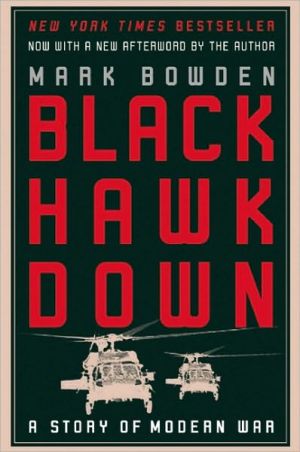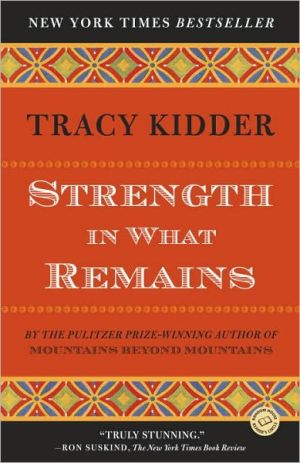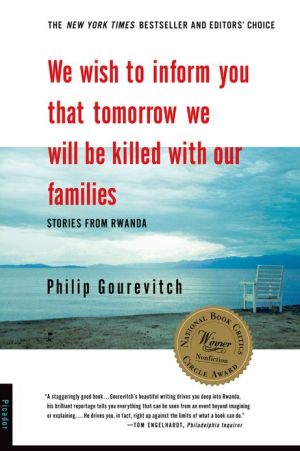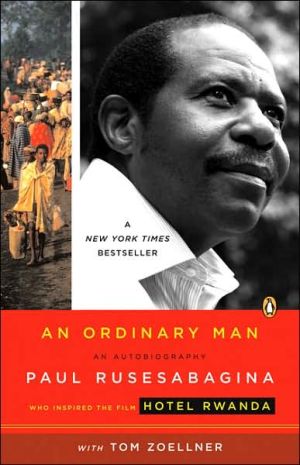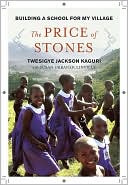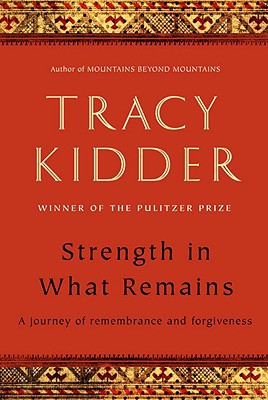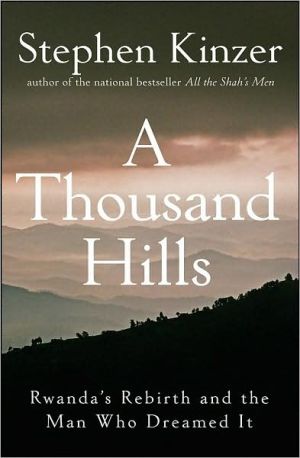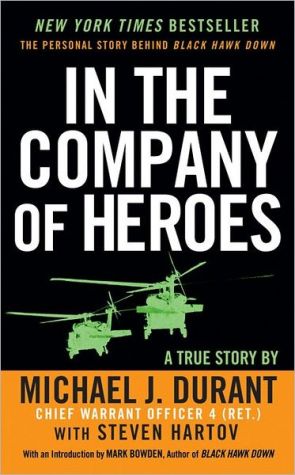Black Hawk Down: A Story of Modern War
Black Hawk Down is Mark Bowden's account of the longest sustained firefight involving American troops since the Vietnam War. On October 3, 1993, about a hundred elite U.S. soldiers were dropped by helicopters into the teeming market in the heart of Mogadishu, Somalia. Their mission was to abduct two top lieutenants of a Somali warlord and return to base. It was supposed to take an hour. Instead they found themselves pinned down through a long and terrible night fighting against thousands of...
Search in google:
The behind-the-lines story of the U.S. Special Forces team dropped into the middle of Mogadishu, Somalia, in 1993 and the intense firefight for their lives they went through. A true-to-life thriller that gives the political story of what U.S. troops were doing there in the first place and the military details of what the streetfighting cost both sides. Salon - Mark Schone One reason movies about war are so hot right now is that few American males have had to face the real thing. For a man who's never braved enemy fire, who's never been "tested," The Thin Red Line and Saving Private Ryan can seem like parables of character. Would I, the ticket buyer wonders, be willing to die for a nameless hill or an unknown soldier?But the blood in these filmed battles is spilled for a larger cause, by men of every station. In real time, long after the last Good War, the dying hasn't stopped; now, though, it's done by blue-collar volunteers in morally muddy police actions. Never has the murk been more obscure than it was in Somalia on Oct. 3, 1993, when, in the American military's nastiest firefight since Vietnam, 19 soldiers died in the name of little more than one another. An incident that began with two downed helicopters ended with American casualties being dragged through the streets and American policymakers scrambling for the exit.Black Hawk Down re-creates, with exacting detail, the gory confusion of that day, when questions of heroism were far from cinematic. Mark Bowden's work ethic inspired him to track down 50 veterans of the conflict and bring back Mogadishu whole. He conveys the sound and the feel of killing — of what it's like to watch your bullets splash through a stranger and of the claustrophobic panic you feel when the strangers you are shooting at begin to close in. He established such trust with his subjects that they told him about everything from the banal ("It felt like a movie") to the brutal (trying to plug a spurting artery with an index finger) to the embarrassing (masturbation in combat). We're reminded that these are young men with excess animal energy that surfaces in both violence and sex, that the flip side of valor is an evil carnal thrill. "That was the secret core of all the hoo-ah ... esprit," Bowden writes. "Permission ... to break the biggest social taboo of all. You killed people." Mogadishu has already inspired several books and documentaries, with another set for CNN in April. Spy planes and surveillance cameras made it one of history's best-documented battles. Bowden's rendering, however, is the most accurate and extensive, because in addition to first-person accounts he wrangled access to confidential Army action logs. He also moves beyond Soldier of Fortune-style bravado, interviewing dozens of enemy combatants so that we can learn why a thousand angry Somalis threw themselves into the high-tech maw of the Army Rangers, sacrificing their lives just to teach the U.S. government a lesson. Sometimes the book bogs down in this conscientious detail — Bowden wants us to know where every man was at every minute. So much data and so many different dramas and casts are braided into this one engagement that the account becomes confusing; more maps and recaps might've helped keep it straight.This is the sort of crowded time line that Web sites were invented for. In fact, the Rangers have used Bowden's original Philadelphia Inquirer articles as the core of their own Mogadishu cyber-memorial, linking the text to maps and bios in a shorter, tighter version of events. But if Bowden had also opted for simplicity, imposing a dramatic arc on confusion and paring away supporting characters, he'd have left some men's last hours unremembered. In other words, if he'd made his peerless record of this forgotten war more like a Web site, he'd have been making it more like a war movie. And that will happen soon enough anyway, because Jerry Bruckheimer has already bought the rights to the book.
The Assault1Black Hawk Down69Overrun133The Alamo199N.S.D.Q.259Afterword351Sources357Acknowledgments381Index383
\ From Barnes & NobleMark Bowden gives the reader an intense "You Are There" look at the October 1993 attempt by a U.S. Special Forces team to abduct two top lieutenants of a Somali warlord in Mogadishu, Somalia -- and shows how the mission turned into a bloodbath that would cost the lives of 18 American soldiers. Ultimately, the incident would lead to the infamous video footage of a soldier's body being dragged through the streets of Mogadishu. Bowden is careful to present both sides of the conflict, giving the reader all the information they need to fully understand the day's tragic events.\ \ \ \ \ Bob Shacochis...A descendent of books like The Killer Angels, a Pulitzer Prize-winning novel about the battle of Gettysburg, and We Were Soldiers Once...and Young, a best-selling eyewitness account of the Vietnam-era battle of Ia Drang; like those two, Black Hawk Down ranks among the best books ever written about infantry combat.\ — New York Observer\ \ \ Mark SchoneOne reason movies about war are so hot right now is that few American males have had to face the real thing. For a man who's never braved enemy fire, who's never been "tested," The Thin Red Line and Saving Private Ryan can seem like parables of character. Would I, the ticket buyer wonders, be willing to die for a nameless hill or an unknown soldier?\ But the blood in these filmed battles is spilled for a larger cause, by men of every station. In real time, long after the last Good War, the dying hasn't stopped; now, though, it's done by blue-collar volunteers in morally muddy police actions. Never has the murk been more obscure than it was in Somalia on Oct. 3, 1993, when, in the American military's nastiest firefight since Vietnam, 19 soldiers died in the name of little more than one another. An incident that began with two downed helicopters ended with American casualties being dragged through the streets and American policymakers scrambling for the exit.\ Black Hawk Down re-creates, with exacting detail, the gory confusion of that day, when questions of heroism were far from cinematic. Mark Bowden's work ethic inspired him to track down 50 veterans of the conflict and bring back Mogadishu whole. He conveys the sound and the feel of killing — of what it's like to watch your bullets splash through a stranger and of the claustrophobic panic you feel when the strangers you are shooting at begin to close in. He established such trust with his subjects that they told him about everything from the banal ("It felt like a movie") to the brutal (trying to plug a spurting artery with an index finger) to the embarrassing (masturbation in combat). We're reminded that these are young men with excess animal energy that surfaces in both violence and sex, that the flip side of valor is an evil carnal thrill. "That was the secret core of all the hoo-ah ... esprit," Bowden writes. "Permission ... to break the biggest social taboo of all. You killed people."\ Mogadishu has already inspired several books and documentaries, with another set for CNN in April. Spy planes and surveillance cameras made it one of history's best-documented battles. Bowden's rendering, however, is the most accurate and extensive, because in addition to first-person accounts he wrangled access to confidential Army action logs. He also moves beyond Soldier of Fortune-style bravado, interviewing dozens of enemy combatants so that we can learn why a thousand angry Somalis threw themselves into the high-tech maw of the Army Rangers, sacrificing their lives just to teach the U.S. government a lesson. Sometimes the book bogs down in this conscientious detail — Bowden wants us to know where every man was at every minute. So much data and so many different dramas and casts are braided into this one engagement that the account becomes confusing; more maps and recaps might've helped keep it straight.\ This is the sort of crowded time line that Web sites were invented for. In fact, the Rangers have used Bowden's original Philadelphia Inquirer articles as the core of their own Mogadishu cyber-memorial, linking the text to maps and bios in a shorter, tighter version of events. But if Bowden had also opted for simplicity, imposing a dramatic arc on confusion and paring away supporting characters, he'd have left some men's last hours unremembered. In other words, if he'd made his peerless record of this forgotten war more like a Web site, he'd have been making it more like a war movie. And that will happen soon enough anyway, because Jerry Bruckheimer has already bought the rights to the book.\ — Salon\ \ \ \ \ \ Steven Komarow[Bowden's] details are amazing. Readers will swear he was there, everywhere, watching as bullets tore through flesh. In the novelistic style adopted by some journalists, Bowden weaves a seamless tale, acknowledging gaps and shortcomings only in his notes at the end.— USA Today\ \ \ \ \ Jonathan YardleyA vivid, immediate and unsparing narrative that is filled with blood and noise.... It bears comparison to S.L.A. Marshall's classic account of a battle in Korea, Pork Chop Hill. \ —Washington Post\ \ \ \ \ Publishers WeeklyThis is military writing at its breathless best. Bowden (Bringing the Heat) has used his journalistic skills to find and interview key participants on both sides of the October 1993 raid into the heart of Mogadishu, Somalia, a raid that quickly became the most intensive close combat Americans have engaged in since the Vietnam War. But Bowden's gripping narrative of the fighting is only a framework for an examination of the internal dynamics of America's elite forces and a critique of the philosophy of sending such high-tech units into combat with minimal support. He sees the Mogadishu engagement as a portent of a disturbing future. The soldiers' mission was to seize two lieutenants of a powerful Somali warlord. Despite all their preparation and training, the mission unraveled and they found themselves fighting ad hoc battles in ad hoc groups. Eschewing the post facto rationalization that characterizes so much military journalism, Bowden presents snapshots of the chaos at the heart of combat. On page after page, in vignette after vignette, he reminds us that war is about breaking things and killing people. In Mogadishu that day, there was no room for elaborate rules of engagement. In the end, it was a task force of unglamorous "straight-leg" infantry that saved the trapped raiders. Did the U.S. err by creating elite forces that are too small to sustain the attrition of modern combat? That's one of the key questions Bowden raises in a gripping account of combat that merits thoughtful reading by anyone concerned with the future course of the country's military strategy and its relationship to foreign policy.\ \ \ \ \ Library JournalBlack Hawk Down is more than a well-crafted action thriller. Ninety-nine elite fighting men, trapped in a hostile city, are running out of ammunition and medical supplies as night falls. A rescue helicopter crashes, and an armored column loses its way. But this is not fiction; the people are real, and Bowden takes pains to show how a peaceful food-for-starving-Africans mission led to U.S. involvement in the battle of Mogadishu and how it extricated itself. This original work is virtually the sole source on the battle; it has won awards and was made into a movie. One caveat: this accurate portrayal of war contains a lot of gore. Narrator Alan Sklar's dramatization of this gripping tale is compelling. Recommended for all collections.DJames L. Dudley, Westhampton, NY Copyright 2002 Cahners Business Information.\ \ \ \ \ Michael MarenAmazing...One of the most intense, visceral reading experiences imaginable....The individual stories are woven together in such a compelling and expert fashion, the narrative flows so seamlessly, that it's hard to imagine that this is not fiction.\ — The Philadelphia Inquirer\ \ \ \ \ Matthew HeimerThis story of a U.S. military mission gone awry belongs in an elite category: nonfiction that you can't put down....[A] page-turner.\ — Brill's Content\ \ \ \ \ William FinneganWhat [the book's] demotic, you-are-there prose lacks in literary finesse...it makes up for in pure narrative drive....Bowden has performed an important service by picking out and meticulously dramatizing such a turning point in recent history. Until [the book] came along, this strange and terrible battle was in danger of being forgotten. \ — The New York Times Book Review\ \ \ \ \ Scott TaylorA fast-paced factual account that reads like a non-fiction thriller....Black Hawk Down is an engrossing read, a well-told tale of modern combat.\ — The Globe and Mail Toronto\ \ \ \ \ Benjamin F. SchemmerI did not 'read' Mark Bowden's Black Hawk Down...I devoured it...[It is] honest journalism and understated drama that probably describes the most likely future of war. \ — Strategic Review\ \ \ \ \ Don MurrayI can't remember having read such good reporting of a combat engagement....Journalistic writing at its best. \ — Boston Globe\ \ \ \ \ Sean D. Naylor...[S]uperb....painstakingly recreates each moment of the battle...The book is full of examples of extraordinary heroism in the face of almost overwhelming odds....[A] riveting description of what might be called the first battle of the 21st century...\ — Washington Monthly\ \ \ \ \ Tom WalkerThe quintessential story of men in combat...If Black Hawk Down were fiction, we'd rank it up there with the best war novels, The Naked and the Dead by Norman Mailer, or The Things They Carried by Tim O'Brien....Bowden captures the essence of combat — the sights and sounds, the terror and the determination, the sheer will to survive. It's an intense and impressive work.\ — The Denver Post\ \ \ \ \ Jim HanerOne of the finest combat reconstructions in the annals of warfare...The result of Bowden's efforts is a detailed after-action report that stands in a league with Shelby Foote's stirring Civil War diary Shiloh — rare in its completeness, compassion and reverence for the valor of young men cast into extraordinary circumstances.\ — The Baltimore Sun\ \ \ \ \ Jonathan YardleyA vivid, immediate and unsparing narrative that is filled with blood and noise.... It bears comparison to S.L.A. Marshall's classic account of a battle in Korea, Pork Chop Hill. \ — Washington Post\ \
